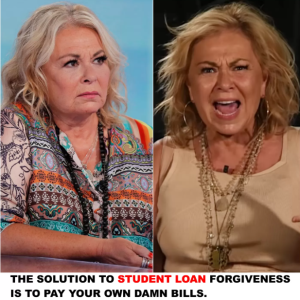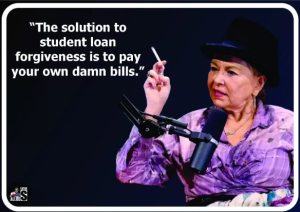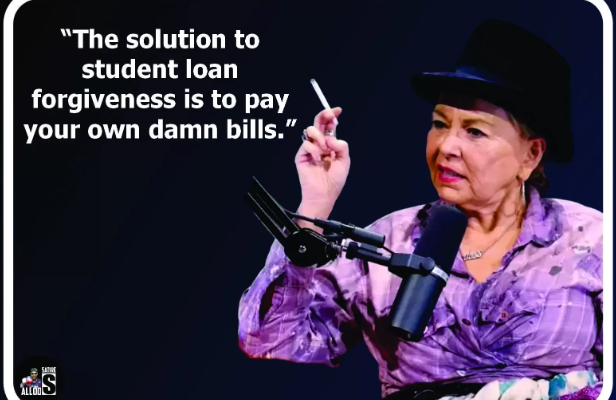The solution to student loan forgiveness is to pay your own damn bills.
In recent years, the topic of student loan forgiveness has sparked intense debateacross America. For many, the burden of student debt is a crushing weight thathampers their financial freedom and ability to build a stable future. However,there are those who believe that the solution to this problem lies not ingovernment intervention, but in personal responsibility. One vocal proponent ofthis view is Roseanne Barr, who has made headlines with her straightforwardstance:”Pay your own damn bills.”

Roseanne, known for her portrayal of a working-class mother on the hit TV show”Roseanne,” has long been an advocate for the average American worker. Herperspective resonates with many who feel that the current push for student loanforgiveness undermines the values of hard work and personal accountability.For Roseanne, the issue boils down to a fundamental understanding of what itmeans to be part of the working class in America.”Nobody could say it better,”she states. “Paying your bills is a part of that.” This sentiment strikes a chord withthose who have labored tirelessly to meet their financial obligations, often withoutthe benefit of a college education.
The working-class perspective emphasizes the importance of self-reliance andthe belief that everyone should be responsible for their own financial decisions.Roseanne’s viewpoint is rooted in the experiences of many who have had to maketough choices to ensure they could support their families and pay their debts.Critics of student loan forgiveness argue that it sets a dangerous precedent. Theybelieve it sends a message that borrowing money does not come with theobligation to repay it, thereby fostering a culture of irresponsibility. From thisperspective, forgiving student loans could be seen as unfair to those who havealready paid off their debts or chose not to attend college to avoid debtaltogether.

Furthermore, opponents contend that student loan forgiveness does not addressthe underlying issues of rising tuition costs and the value of a college degree intoday’s job market.They argue that the focus should instead be on making higheeducation more affordable and ensuring that students are making informedchoices about their educational paths.The debate over student loan forgiveness is part of a larger cultural conversationabout the role of government in addressing economic inequality. Proponents ofloan forgiveness argue that it is a necessary step to provide relief to millions ofAmericans struggling with debt and to promote economic mobility.
On the other hand, those like Roseanne advocate for a return to traditional valuesof personal responsibility and financial prudence. They believe that encouragingindividuals to take ownership of their debts will ultimately lead to a more robustand self-sufficient society.While the debate is often polarized, there is potential for finding common ground.Solutions could include a combination of limited loan forgiveness, income-drivenrepayment plans, and policies aimed at reducing the cost of higher education. Byaddressing both the symptoms and the root causes of the student debt crisis, itmay be possible to create a more balanced approach that respects both personalresponsibility and the need for systemic reform.The discussion around student loan forgiveness is complex and multifaceted.Roseanne Barr’s call to “pay your own damn bills” highlights a critical viewpointthat underscores the value of hard work and personal accountability. As Americacontinues to grapple with the issue, it is essential to consider the perspectives ofthose who feel that personal responsibility should remain at the forefront of anysolution. Whether through individual effort or collective action, the goal remainsthe same: to create a fair and equitable system that supports all Americans intheir pursuit of financial stability and success.



